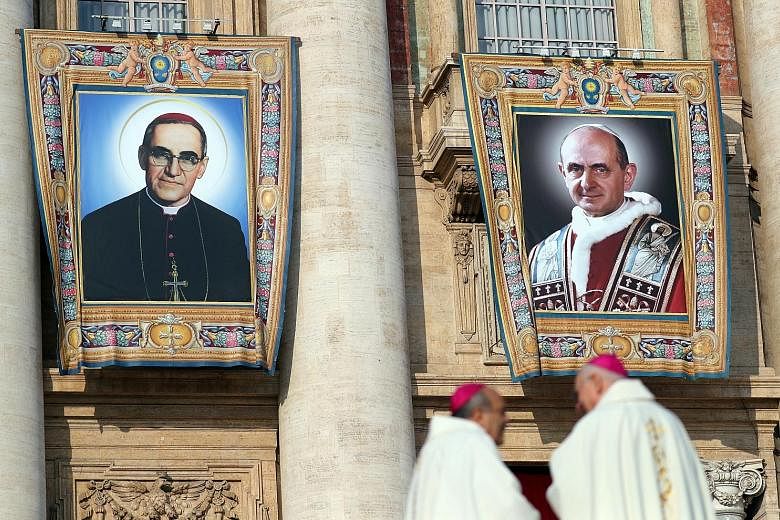VATICAN CITY • Pope Francis has made saints of two of the most contentious Roman Catholic figures of the 20th century - murdered Salvadoran Archbishop Oscar Romero and Pope Paul VI, who reigned over one of the Church's most turbulent eras and enshrined its opposition to contraception.
In a ceremony before tens of thousands of people in St Peter's Square yesterday, Pope Francis declared the two men saints, along with five other lesser-known people who were born in Italy, Germany and Spain in the 18th and 19th centuries.
Both Archbishop Romero, who was shot by a right-wing death squad while saying mass in 1980, and Pope Paul, who guided the Church through the conclusion of the modernising 1962-1965 Second Vatican Council, were contested figures within and without the Church.
Both were naturally timid men who were thrust to the forefront of history by the convulsive political and social changes of the 20th century, and both had a lasting influence on the current pontiff, Pope Francis, Latin America's first Pope.
In his homily, read with tapestries of images of the seven new saints hanging from St Peter's Basilica behind him, Pope Francis called Pope Paul "a prophet of an extroverted Church" who opened it up to the world. He praised Archbishop Romero for disregarding his own life "to be close to the poor and to his people".
The archbishop, who had often denounced repression and poverty in his homilies, was shot dead on March 24, 1980, in a hospital chapel in San Salvador, capital of impoverished El Salvador in Central America.
His murder was one of the most shocking in the long conflict between a series of United States-backed governments and leftist rebels in which thousands were killed by right-wing and military death squads. It was widely believed to have been ordered by right-wing Arena party's founder Roberto D'Aubuisson.
The archbishop consistently denounced violence by the Salvadoran military and paramilitary against civilians and urged the international community to stop the oppression.
Pope Francis often quotes Pope Paul VI, showing that he is committed to the reforms of the council, which allowed the mass to be said in local languages instead of Latin, declared respect for other religions, and launched a landmark reconciliation with Jews.
Still, today, ultra-conservatives in the Church do not recognise the council's teachings and blame Pope Paul for starting what they see as a decline in tradition.
REUTERS

